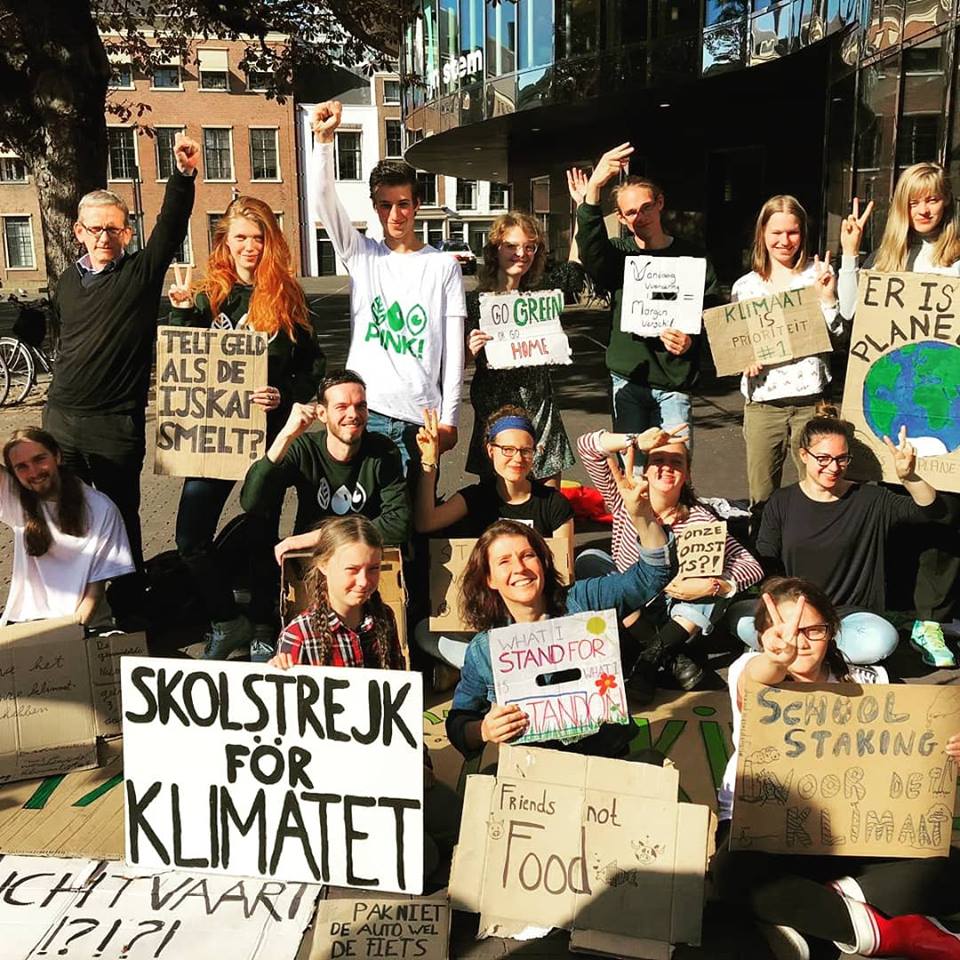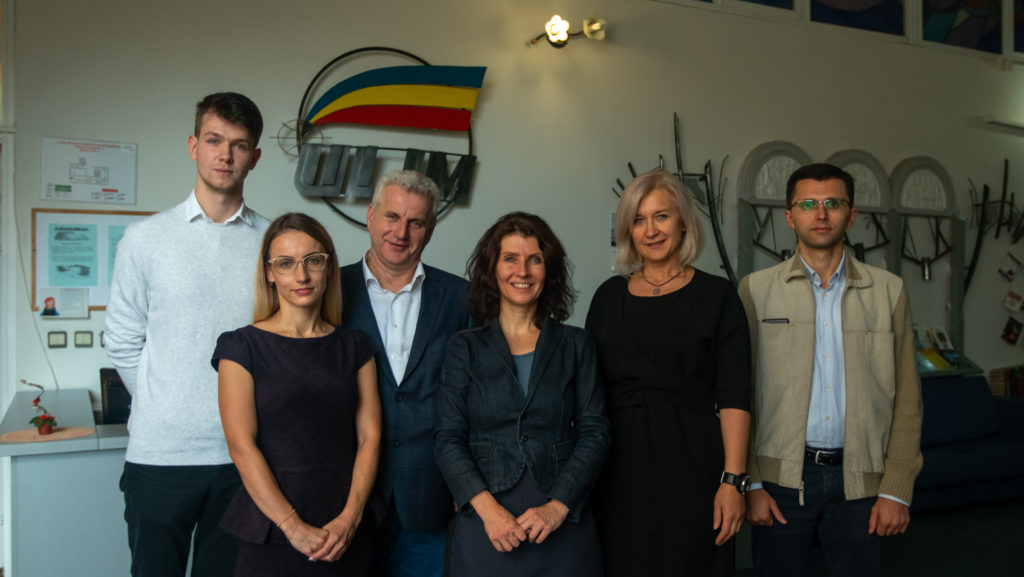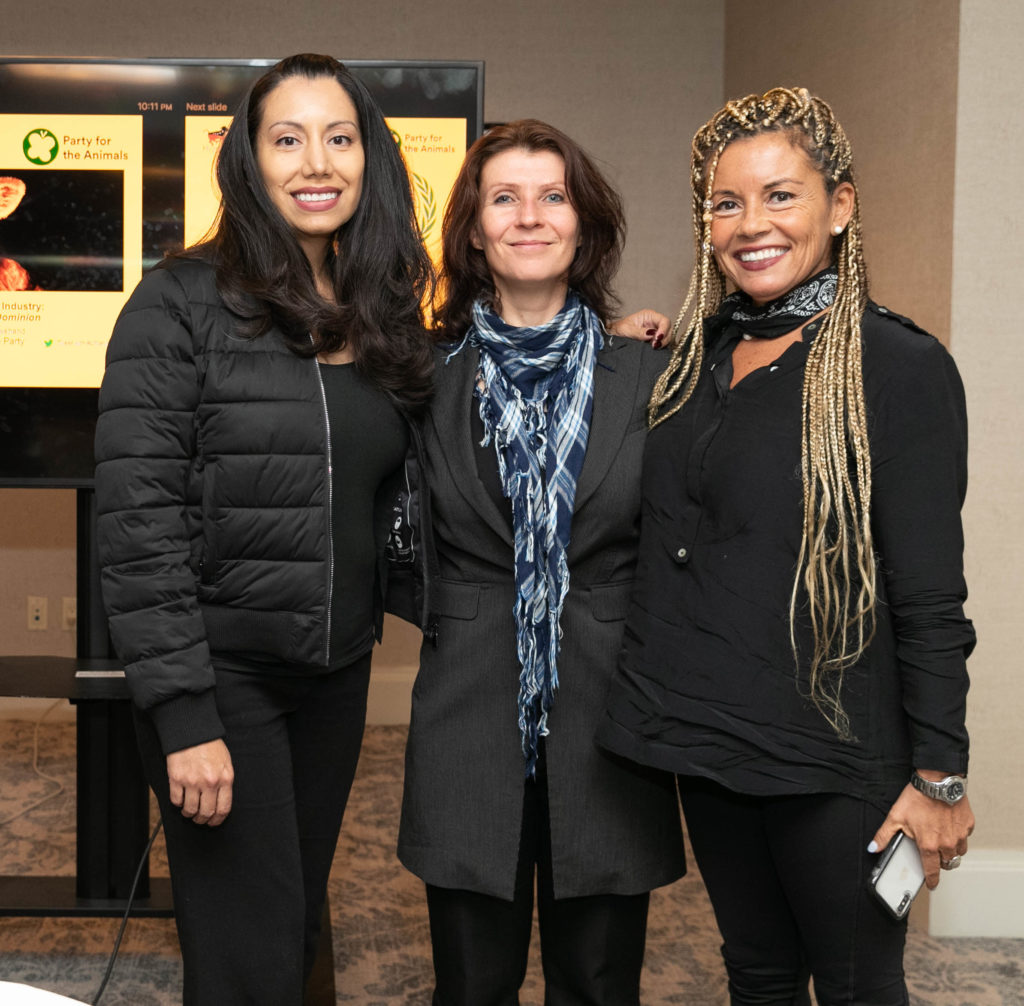Worldlog Esther Ouwehand 6 novembre 2018
With our party leader Marianne Thieme on sick leave, I now act as deputy Chairperson of our Lower House faction and will therefore also take over the Worldlog. Like Marianne, I have been a Lower House Member for the Dutch Party for the Animals for nearly 12 years now, and I am looking forward to using this Worldlog to interact with people around the world who share our passion for this beautiful planet and the animals living on it. After all, it is essential to deal with the major problems of our time across borders.
And it is happening. Around the world, young people take it upon themselves to stimulate their governments to act against climate change. In countries such as the United States, Colombia and Pakistan, children are suing their governments, which are still conserving the status quo despite the consequences for the planet and for younger generations.
My heart made a little jump when 15-year-old Greta Thunberg from Sweden single-handedly changed the course of the Swedish election campaign, by going on a ‘school strike’ outside the Swedish Parliament. Rather than going to school, she took her protest sign to the parliament building every day, showing politicians that they should take the necessary climate action. Her campaign was picked up by the national and international press, unleashing a global action of young students going on strike outside their own parliaments in favour of the climate. Our own youth wing PINK! soon began its climate strike outside the Dutch Parliament, attracting much attention for the climate and the necessity to listen to young people, rather than the fossil industry and industrial agriculture.

Greta Thunberg with Esther Ouwehand and PINK! members outside the Dutch Parliament
On Friday, 5 October, Greta joined the student strike in the Netherlands, and I was very honoured to take her inside and have her take her place on the rostrum of our parliament. After all, the voice of the next generation, begging for a sustainable future and a healthy planet, must be heard. “We cannot save the world if we keep playing by the rules, because it is precisely those rules that need to be changed,” she said – and she is absolutely right!
Always remember that you alone can start a great movement by standing up for your ideals. Because of the actions of one 15-year-old girl from Sweden, there have been school strikes for the climate in the Netherlands, Germany, Great-Britain and Belgium. At the moment young people are on a strike in Australia and on 30 November, they are organising a mass strike across the country, in protest against their government’s mismanagement. Go Team Planet!
Last October, a judge in the Netherlands agreed with all these young people for the second time by ruling that the Dutch State is taking insufficient action against climate change and is thereby acting unlawfully. A historic victory for our planet and all its inhabitants. The tilting moment that the climate really, really needed. Hopefully, many similar verdicts will follow in other countries.
In the meantime, the call from scientists is also growing louder and louder: stop breeding and killing animals, or it is goodbye to the climate. It is vital that this message is taken seriously by people around the world. That is why I recently visited a packed university room in Moldova at the invitation of animal rights lawyer Ion Dron, to give a lecture on the necessity of compassion and sustainability as a starting point for all policies, but especially the agricultural policy. This was the first time a lecture on animal rights was held in Moldova, and the interest was overwhelming. Amazing!
Moldova has all the essentials to deliver the food of the future: fertile lands and a great variety of crops, making it possible to cultivate a natural resistance against insects and plagues. Agriculture without overfertilization and the use of agricultural chemicals, producing plenty of plant proteins for human consumption: that is what Europe needs. But at the same time, the lobby of foreign companies aiming to expand industrial livestock farming in Moldova is growing. Now that the western livestock industry is in crisis and western people no longer tolerate the industry destroying their living environment, the industry sees opportunities to relocate its polluting practices to Eastern Europe. This would be a disaster for Moldovan nature, animals, people and environment.

Esther Ouwehand in Moldova
Luckily, even in the poorest country of Europe there are still people who are brave enough to oppose the lobby. I had the honour to speak to some of them: from emerging animal-friendly politicians to local animal campaigners, from a farmer to an organic crop farming expert. The world is in dire need of people like them.
If there is anyone who needs to face the fact that intensive livestock farming is violating the rights of animals and endangering the planet, peace and safety at the same time, it is the United Nations policy makers. If we don’t drastically reduce the consumption of animal products, many of the UN’s good efforts – combating hunger, tackling climate change, maintaining peace and security – will have been for nothing. At the end of October, when I joined the Dutch socio-political delegation on a visit to the UN headquarters in New York, I seized the opportunity to put the absolute necessity of eating more plant-based foods on the agenda. I confronted the UN policy makers with the inconsistency of their policies: although reports of UN bodies clearly state that we have to drastically reduce our meat consumption, there is nothing in their policies that takes this fact into account. Worse still, it is mainly meat and diary that is served in the UN headquarters. Absurd.
As a side event to my official visit to the UN, I screened the ground-breaking Australian documentary Dominion. I wanted to start the debate, not only on the violence done to animals in livestock farming, but also on the threat livestock farming poses to peace and security in the world.

Esther Ouwehand in New York
In addition, I gave a lecture at New York University on animal rights and the need for political action. Visiting Central Park with American activists, I called for an end to the horse carriages in New York, which forces horses to work under appalling conditions. Thanks to the Party for the Animals, horse carriages will soon be illegal in Amsterdam.
In New York I received a warm welcome from our American sister party The Humane Party, who in 2015 participated in the Presidential elections as the world’s very first completely vegan candidates. On 6 November the senatorial elections will take place, and two members of The Humane Party will participate. Both candidates are concerned with increasing the role of science, compassion and social justice in politics. They therefore focus on the abolition of livestock farming – or, as one member put it: “You cannot discuss climate change without discussing the livestock sector.”
In the meantime, our own rich country continues to engage in animal suffering and pollution. Time after time structural injustices in the livestock sector come to light: the animals are slaughtered at, quite literally, a murderous pace, they are mistreated and abandoned to their fate in the farm fires which happen nearly every month. Environmental limits are exceeded, supervision fails and whoever speaks up is silenced. And still, the established political parties remain in a state of denial and bury their heads in the sand. This injustice has to stop.
We can turn the tide if we choose a fundamental system change: a system that is more plant-based and more sustainable, without the use of agricultural chemicals or chemical fertilisers and without the large-scale exploitation of defenceless animals. As November happens to be Vegan Month, I just want to say: take up the challenge!
A causa del congedo per malattia della nostra leader del partito, Marianne Thieme, prenderò da oggi in consegna il Worldlog da come vicepresidente della nostra frazione nel parlamento. Proprio come Marianne, ho lavorato come deputato al Parlamento per il Partito per gli animali olandese per quasi 12 anni e non vedo l’ora di interagire con persone di tutto il mondo che condividono la nostra passione per questo splendido pianeta e gli animali. Dopo tutto, è fondamentale affrontare insieme, oltre i confini, i principali problemi dei nostri tempi.
E questo succedo. Ovunque nel mondo, sempre più giovani si stanno alzando per richiedere dai propri governi azioni per il clima. In paesi come gli Stati Uniti, la Colombia e il Pakistan, bambini stanno intentando azioni legali contro i loro governi che sostengono lo status quo degli interessi acquisiti a spese del pianeta e delle giovani generazioni.
Il mio cuore si è scaldato quando la quindicenne svedese Greta Thunberg, da sola ha messo alla prova la campagna elettorale svedese, dando inizio a uno “sciopero scolastico” per il clima al Parlamento di Stoccolma. Invece di andare a scuola, andava ogni giorno al palazzo del parlamento con il suo cartello di protesta, per mettere in chiaro che i politici devono prendere le misure climatiche necessarie. La sua azione è stata ripresa dalla stampa nazionale e internazionale, e in questo modo ha scatenato un’azione studentesca mondiale di giovani che hanno iniziato a scioperare ai propri parlamenti per il clima. La nostra organizzazione giovanile PINK! ha organizzato velocemente uno sciopero per il clima vicino al nostro parlamento, che ha anche suscitato molta attenzione per il clima e la necessità di ascoltare i giovani, anziché le società fossili e l’agricoltura industriale.

Greta Thunberg, insieme a Esther Ouwehand e ai giovani di PINK! davanti al parlamento olandese
Venerdì 5 ottobre, Greta si è unita allo sciopero degli studenti nei Paesi Bassi, e sono stata molto onorata di portarla dentro e prendere posto dietro il leggio del nostro parlamento. La voce della prossima generazione, che supplica per un futuro vivibile per una terra sana, deve essere ascoltata. “Non possiamo salvare il mondo giocando secondo le regole, perché sono proprio queste regole che dobbiamo cambiare”, dice lei – ed è proprio così!
Non dimenticare mai che tu, come individuo che difende i suoi ideali, puoi iniziare un grande movimento. Poiché una ragazza di 15 anni ha iniziato in Svezia, ci sono stati organizzati scioperi scolastici per il clima da giovani nei Paesi Bassi, in Germania, Gran Bretagna e Belgio. Attualmente anche giovani australiani stanno scioperando e il 30 novembre organizzano uno sciopero di massa in tutta l’Australia, in segno di protesta contro la cattiva gestione del loro governo. Go Team Planet!
Il giudice olandese ha dato ragione a tutti questi giovani per la seconda volta in ottobre e ha dichiarato: lo stato olandese fa troppo poco contro il cambiamento climatico e cosi agisce illegalmente. Una vittoria storica per il nostro pianeta e -tutti- suoi abitanti. Il momento di svolta in cui il clima aveva tanto, tanto bisogno. Speriamo che seguiranno ancora tante altre sentenza come questa in altri paesi.
E mentre questo accade, si sente anche l’appello da parte della scienza sempre più incisivo: smettetelo di allevare e uccidere gli animali, altrimenti potete anche scordarvi il clima. È di vitale importanza che questo messaggio venga raccolto in tutto il mondo. Per questo motivo ho recentemente, su invito dell’avvocato per i diritti degli animali Ion Dron, visitato la Moldavia, dove ho tenuto in una, completamente riempita, aula universitaria una conferenza sulla necessità di prendere compassione e sostenibilità come punto di partenza per ogni politica, ma certamente in agricoltura. Era la prima volta che in Moldavia veniva tenuta una conferenza sui diritti degli animali e l’interesse era travolgente. Fantastico!
La Moldova ha tutto ciò di cui ha bisogno per il cibo del futuro: terreni fertili e una grande varietà di colture, che consente di coltivare la naturale resistenza agli insetti e ai parassiti. Un’agricoltura senza eccessiva fertilizzazione e pesticidi, con abbondanza di proteine vegetali per il consumo umano: questo è ciò di cui l’Europa ha bisogno. Ma c’è anche una crescente lobby di aziende straniere per espandere gli allevamenti industriali in Moldova. Ora che l’industria del bestiame occidentale è in crisi e le persone nell’occidente sono sempre meno tolleranti sul fatto che l’industria stia distruggendo il loro ambiente, l’industria vede opportunità per spostare le sue pratiche inquinanti verso l’Europa orientale. Sarebbe un disastro per la natura, gli animali, le persone e l’ambiente moldavo.

Esther Ouwehand in Moldavia
Anche in questo paese, il più povero d’Europa, fortunatamente ci sono anche persone coraggiose che osano opporsi a questa lobby. Ho avuto l’onore di parlare ad alcuni di loro: da politici emergenti e animalisti e protezionisti animali locali, a un agricoltore e un esperto nel campo dell’agricoltura biologica. Il mondo ora ha un gran bisogno di queste persone.
Se qualcuno ha bisogno di rendersi conto del fatto che l’allevamento intensivo del bestiame viola i diritti degli animali, mentre allo stesso tempo mette in pericolo il pianeta, la pace e la sicurezza, lo sono i responsabili delle politiche all’interno delle Nazioni Unite. Se non riduciamo drasticamente il consumo di prodotti di origine animale, molti degli sforzi positivi dell’ONU (combattere la fame, affrontare i cambiamenti climatici, monitorare la pace e la sicurezza) saranno vani. Quando ho dovuto visitare la sede dell’ONU a New York con la delegazione politico-sociale olandese alla fine di ottobre, ho subito colto l’opportunità di mettere all’ordine del giorno l’assoluta necessità di un maggior numero di alimenti vegetali. In tal modo, ho confrontato le figure politiche delle Nazioni Unite con la politica contraddittoria delle Nazioni Unite: da un lato, i rapporti degli organismi delle Nazioni Unite suggeriscono che dobbiamo ridurre drasticamente il consumo di carne, ma d’altra parte, nulla è stato fatto nella politica dell’ONU. Presso la sede centrale delle Nazioni Unite, vengono servite principalmente carne e latticini. Assurdo.
Come evento secondario alla mia visita ufficiale alle Nazioni Unite, ho presentato il documentario australiano rivoluzionario Dominion. In questo modo ho cercato non solo di aprire il dibattito sulla violenza che gli animali subiscono negli allevamenti di bestiame, ma anche il dibattito sulla minaccia che l’allevamento di bestiame forma per la pace e la sicurezza nel mondo.

Esther Ouwehand a New York
Inoltre, ho tenuto una conferenza all’Università di New York sui diritti degli animali e sulla necessità di azione da parte della politica. Durante una visita a Central Park insieme ad attivisti americani, ho fatto un appello per fermare le carrozze a cavallo a New York, dove i cavalli fanno il loro lavoro in condizioni miserabili. Ad Amsterdam, le carrozze a cavallo saranno presto bandite grazie al Partito per gli Animali.
A New York sono stato anche accolto calorosamente dal nostro partito fratello americano The Humane Party. Nel 2015 il partito ha proposto, per la prima volta nella storia del mondo, candidati vegani per le elezioni presidenziali. Il 6 novembre ci sono nuove le elezioni e si candidano due membri del The Humane Party. Entrambi i candidati vogliono portare più scienza, compassione e uguaglianza sociale nella politica. Si concentrano quindi sull’abolizione dell’industria del bestiame. O come dice uno dei candidati: “Non si può parlare di cambiamenti climatici senza parlare anche dell’industria del bestiame.”
Nel frattempo, il nostro paese ricco continua a essere colpevole di sofferenza animale e inquinamento. Di continuo vengono mostrate malversazioni strutturali nell’industria del bestiame: gli animali vengono letteralmente massacrati, maltrattati e lasciati al loro destino in incendi delle stalle quasi mensilmente. I limiti ambientali sono superati, il controllo fallisce e chi ne parla è messo a tacere. Ma i partiti politici affermati continuano a negare e mettono la loro testa nella sabbia. Questa ingiustizia deve finire.
Noi possiamo invertire la tendenza scegliendo un cambiamento di sistema fondamentale: dobbiamo diventare più vegetale, più sostenibile, senza veleno, senza fertilizzanti artificiali e senza lo sfruttamento su larga scala di animali indifesi. Novembre e il mese del veganismo, quindi direi: accetta la sfida !